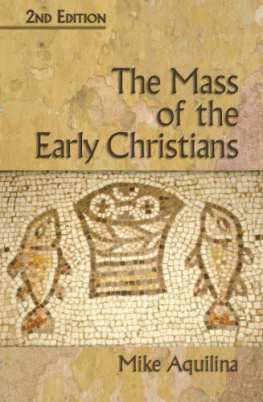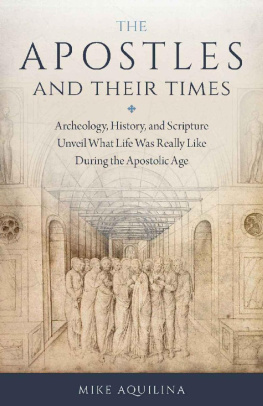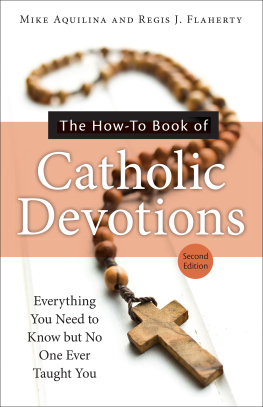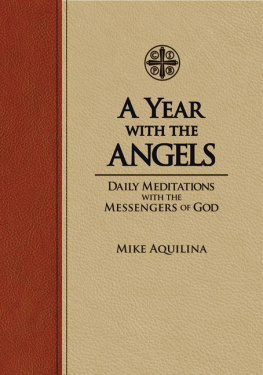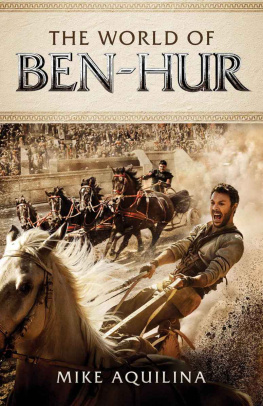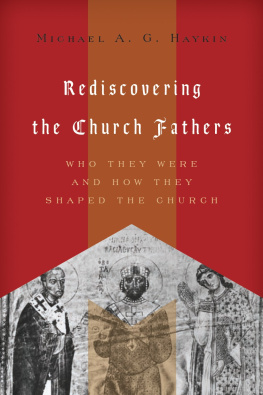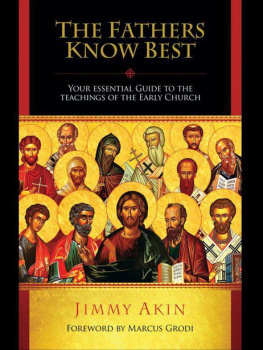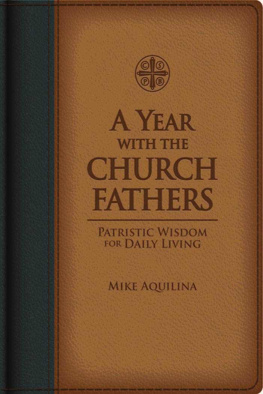Faith of Our Fathers
Faith of Our Fathers
Why the Early Christians Still Matter
and Always Will
by Mike Aquilina
with an introduction by David Mills

Steubenville, Ohio
A Division of Catholics United for the Faith
www.emmausroad.org

Emmaus Road Publishing
827 North Fourth Street
Steubenville, Ohio 43952
2012 Mike Aquilina
All rights reserved. Published 2012
Printed in the United States of America
15 14 13 12 1 2 3 4 5
Library of Congress Control Number: 2012950283
ISBN: 978-1-937155-87-2
Unless otherwise noted, Scripture quotations are taken from the Catholic Edition of the Revised Standard Version of the Bible, 1965, 1966 by the Division of Christian Education of the National Council of the Churches of Christ in the United States of America. Used by permission. All rights reserved.
Excerpts from the English translation of the Catechism of the Catholic Church for the United States of America 1994, United States Catholic Conference, Inc.Libreria Editrice Vaticana. English translation of the Catechism of the Catholic Church: Modifications from the Editio Typica 1997, United States Catholic Conference, Inc.Libreria Editrice Vaticana. Cited in the text as CCC.
Cover design and layout by Julie Davis, General Glyphics, Inc., Dallas, Texas
Cover art: The Four Doctors of the Church with the Symbols of the Four Evangelists. 1516. Sacchi, Pier Francesco (1485-1528). Photo Credit: RMN-Grand Palais / Art Resource, NY.
DEDICATION
TO CARDINAL DONALD WUERL
in gratitude for all hes done for the Church
and for my loved ones
ACKNOWLEDGMENTS

MOST OF THESE PIECES GOT STARTED because some editor had a great idea. Almost all of them got done because some editor reminded me of a deadline. Id like to thank those editors: Msgr. Owen Campion, Bill Cone, Bill Dodds, Joyce Duriga, Michael Hahn, Gerry Korson, Bob Lockwood, David Mills, Sarah Rozman, David Scott, Michael Steier, Mike Sullivan. God bless them all for their love of the Fathersand for consistently making me look smarter than I am.
I acknowledge their estimable publications, too, for deigning to publish my work: Catholic Heritage, Catholic New World, Lay Witness, Our Sunday Visitor, Pittsburgh Catholic, The Priest, and Touchstone.
I am grateful especially to Mike Sullivan for bringing this book to press and to my beloved godson David Mills for contributing the introduction (which is my favorite part of the book).
Thanks be to my wife, who bought me the Catholic University of America edition of the Fathers, so many years ago, and got this whole thing started. Thanks be to God, from whom all blessings flow.
CONTENTS

INTRODUCTION

BY DAVID MILLS
ONE CHILD WHISPERS TO ANOTHER, the message going from Jenny to Bobby to John to Mungo and on to the bright and chipper little girl who always seems to be sitting in the last chair, till she tells everyone what she heard, which is not what the teacher had whispered to the first child. Weve all played this game in grade school, with the same result. My sixth grade teacher, knowing sixth graders, had promised some fabulous prize to the class if we could get the message right, but we couldnt. We didnt come close. I still remember the collective groan and the look on the little girls face when she realized shed delivered bad news rather than good.
Its a useful lesson in what happens when people try to pass on a message. I think of it whenever someone says that we should submit ourselves to the Church fathers because they wrote just one hundred or two hundred or four hundred years after the Resurrection. They were so close to Jesus and the Apostles, they must have gotten it right. From them well get the real story, pure and undefiled. They were right there, or anyway, they were almost right there.
But they really werent. They were sitting where John or Mungo were sitting. If kids trying their hardest to pass on the exact words cant manage to do it in five minutes, how can we expect dozens or hundreds of very different people over decades or centuries to do it?
Who knows how much the message had changed along the way? Who knows how much of the story had been changed and polished and refined till it sounded just right, the way urban legends develop as people revise the stories to make them say what they feel they should say. After a while, everyone who hears the stories thinks they must be true, because, you know, they just sound right. They sound right only because almost everyone who told it helped make it sound right.
This is the argument skeptical scholars have been making against the Fathers for two hundred years or so. They insist that no group of people could have kept the message straight over that much time, and that the early Christians would naturally have changed the story to make it sound better to them. What we think of as Christian teaching, they say, is really a kind of ancient urban legend.
Some of these scholars, for example, decided that as the early Christians passed on the original pure message of grace and freedom they added all the laws and structures we now think of as part of life in the Church, because they needed rules, and they needed rulers. They couldnt live without crutches, so they put them into the story. The modern scholars called this retreat from what Jesus wanted early Catholicism. All that doctrine, all those bishops, all that morality, that wasnt what Jesus had taught, but what frightened or lazy Christians had inserted into the story as they passed it along.
This way of thinking about the Fathers became the academic standard, and remains so today. If you study the Fathers, you assume that they came to believe what they believed because they believed many of the same things as everyone else they knew and they revised the beliefs theyd received to make them more enjoyable. You dont read them as authorities but as people who helped create or refine an urban legend.
You also believe that their beliefs were only one alternative among the early Christians and not necessarily the obvious choice to survive. They won the arguments, sometimes by using the state to enforce their will, and so the average Christian today naively assumes that they were right. For these skeptics, all orthodox Christianity means is the beliefs of the winners.
The modern scholarly skeptics are not the only ones whove downgraded the Fathers. Some aggressive Protestants have been making pretty much the same argument since the Reformation, but with a twist. They rejected the Fathers teaching when it contradicted Protestant commitments, as when some of them wanted to reject the papacy and others wanted to reject bishops in general. In these cases, they argued that the Fathers had corrupted Scripture.
But they also accepted the Fathers, when they could push the teaching they liked back far enough to use the Fathers as if they were early Protestants. They often quoted Cyril of Jerusalem or Augustine on Scripture against what they insisted was the Churchs corrupt elevation of Tradition over Scripture. They thought (and their descendents often think) that they were scoring points against the Catholic Church by taking away the Fathers that Catholics had used to defend and explain the teachings at stake in the Reformation.
Next page

